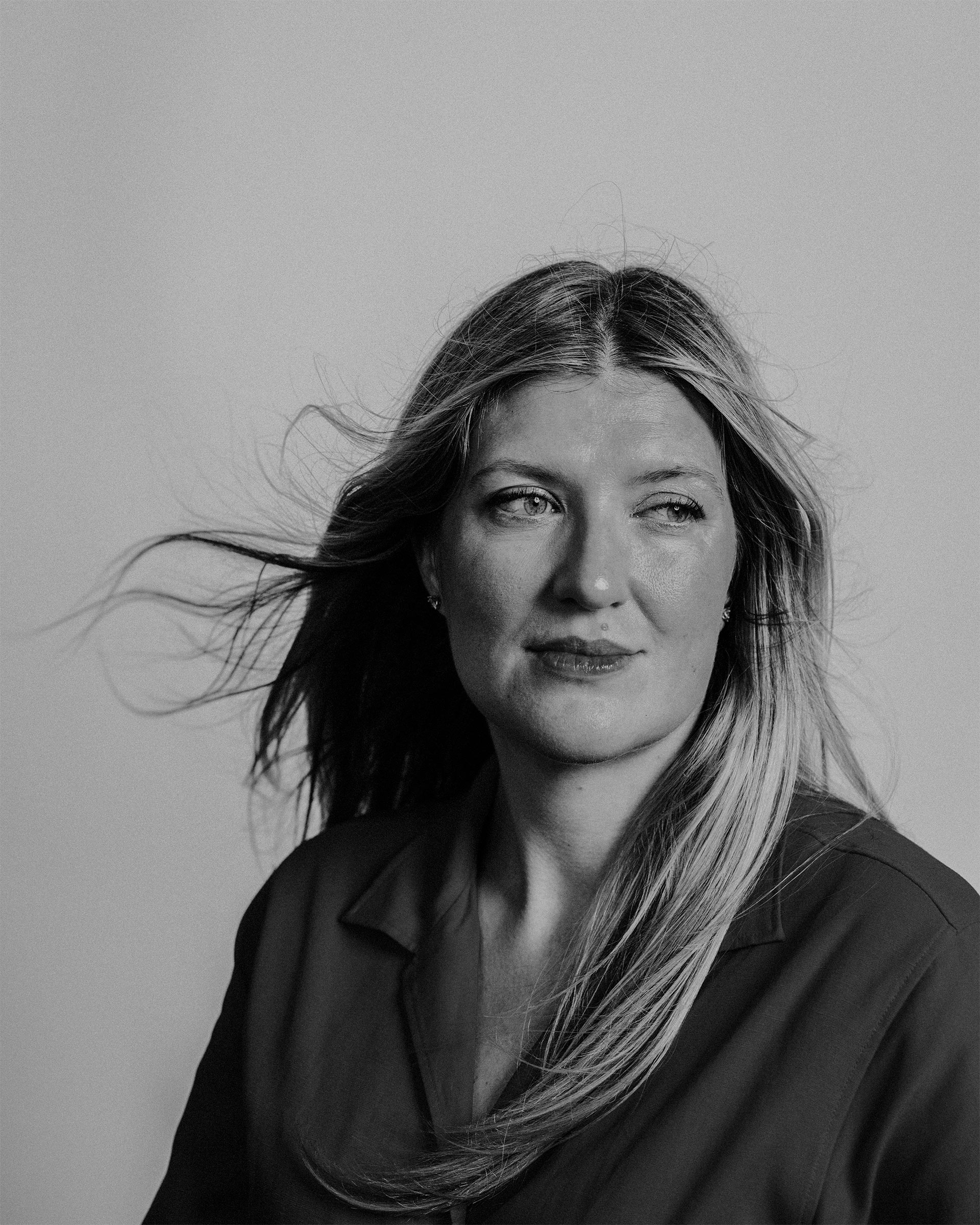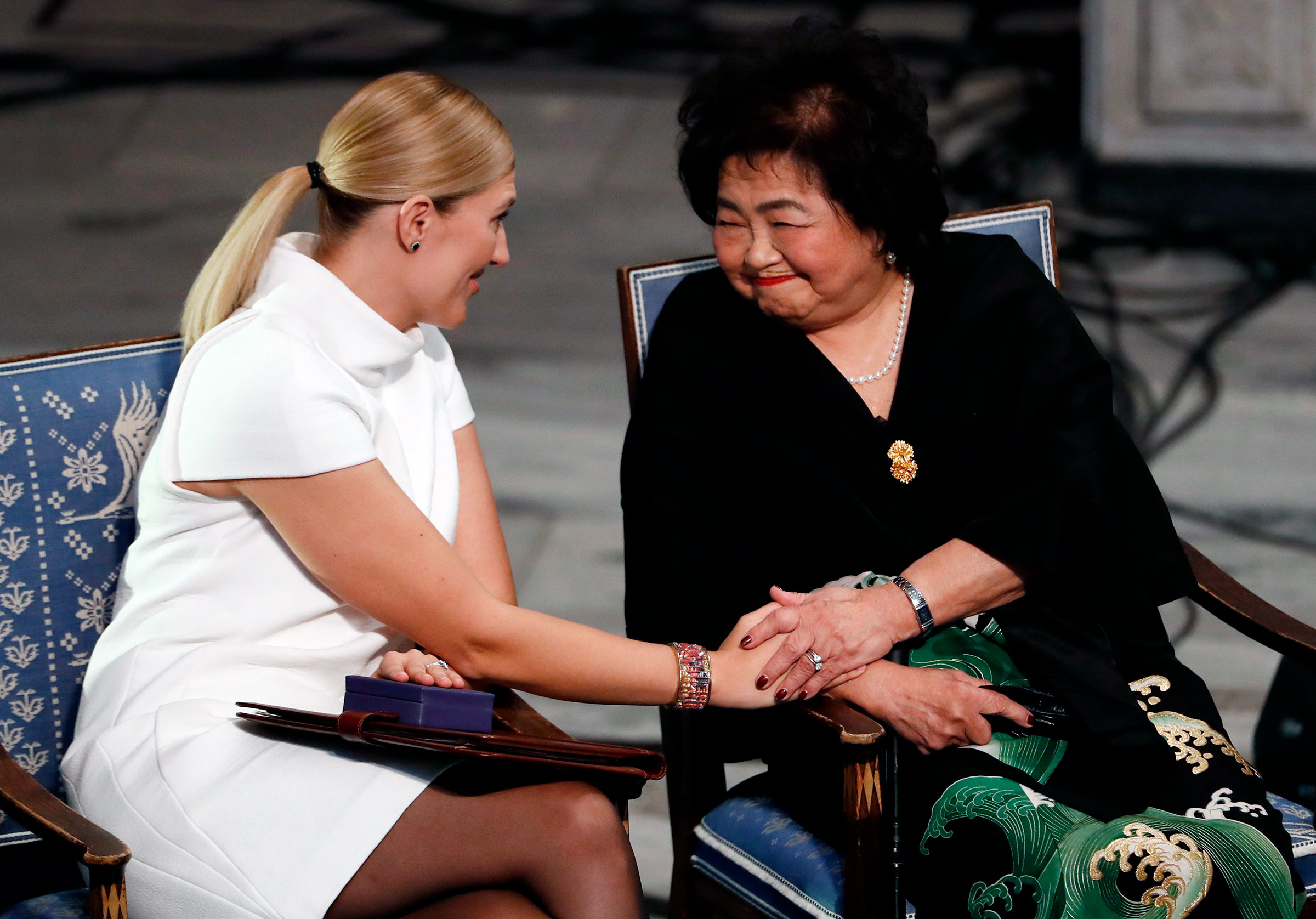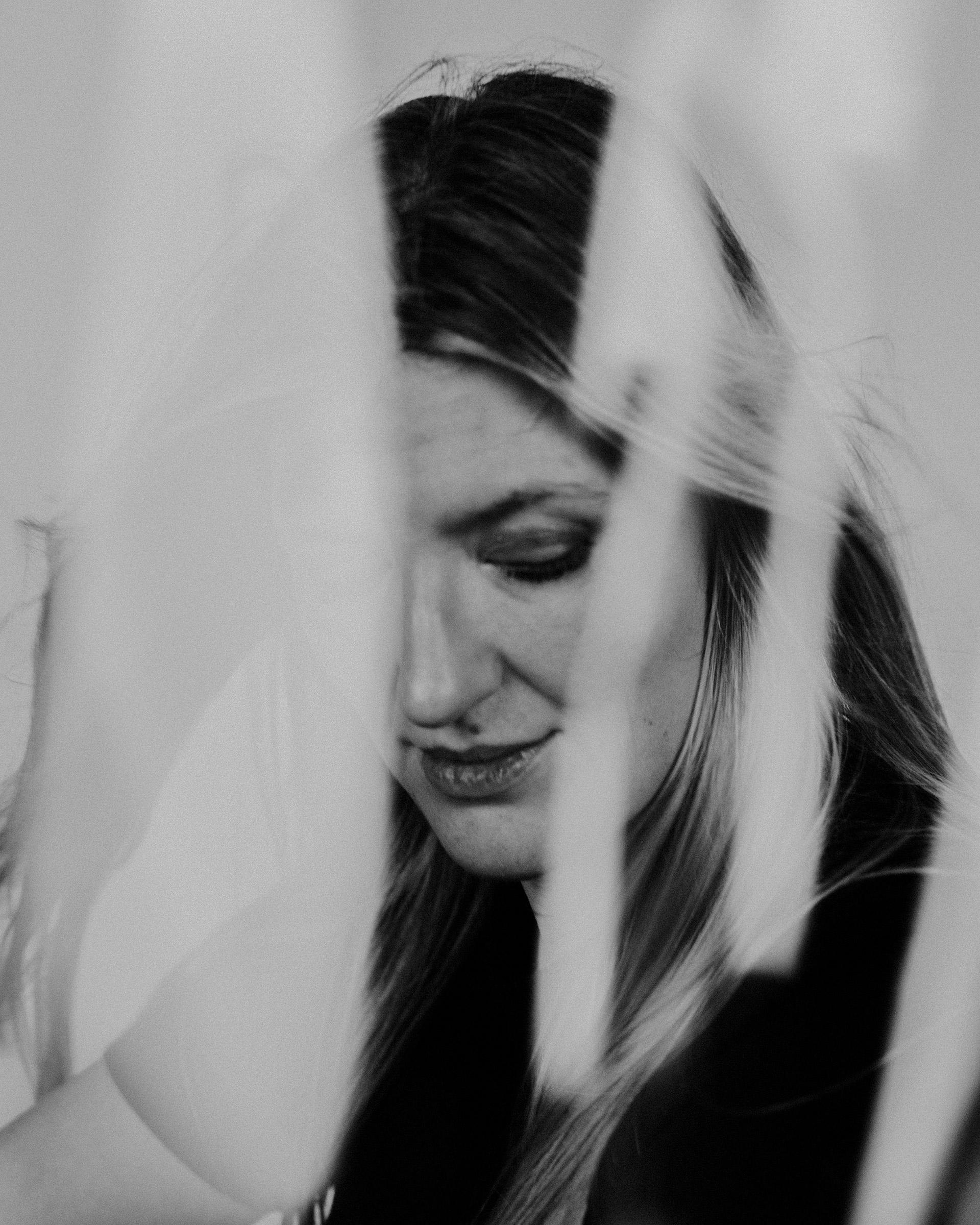
March 2017 was an exhilarating time for Beatrice Fihn. The executive director of the International Campaign to Abolish Nuclear Weapons (ICAN) was at the U.N. in New York City for talks with more than 120 countries to negotiate a treaty on banning nuclear weapons. One moment still stands out: Nikki Haley, then U.S. ambassador to the U.N., and a group of diplomats from several NATO countries held a press conference outside the General Assembly to protest the talks.
“It was such a hilarious role reversal,” Fihn tells me when we meet for lunch in New York this fall, referring to all the times nuclear-disarmament activists have been outside the corridors of power. “Now, we were in the driver’s seat.”
Fihn, 40, has been trying to shift these dynamics ever since she took the helm of the Geneva-based ICAN nearly a decade ago. In 2017, the charismatic Swedish lawyer was thrust into the spotlight when she accepted the Nobel Peace Prize for ICAN’s work to draw attention to the humanitarian consequences of nuclear weapons and its efforts to establish the Treaty on the Prohibition of Nuclear Weapons (TPNW). Now ratified by 68 countries, mostly in the Global South, the ban treaty entered into force in January 2021—the first international legally binding agreement to ban nuclear weapons and associated activities, from testing to development.
However, since then, Fihn feels like things have backslid. Vladimir Putin’s threats have reminded the world that nuclear war is not just a Cold War–era concern. In a March poll, 7 in 10 Americans said Russia’s invasion of Ukraine increased the possibility of nuclear weapons being used anywhere. Polls in Poland and France reflected similar concerns. “There’s so much happening and it’s hard to keep up—a lot of anxiety and awfulness,” Fihn says. Growing great-power competition—from Kim Jong Un’s nuclear tests to China’s rapidly expanding arsenal—raises the stakes for Western democracies, she argues. “Nuclear weapons make us vulnerable to dictators that do not answer to their people.”
Read More: What the West Should Do If Putin Uses a Nuclear Weapon
Though Fihn announced in November that she would step down as ICAN’s executive director at the end of January, she plans to remain involved and is optimistic about this moment, pointing to progress made after crises in the 1960s and 1980s when the world came to the brink of nuclear war. “People are talking about nuclear weapons more than they have since the ’80s. We have to use this to build a bigger movement—to double or triple in size—so we can set the stage for when the war in Ukraine is over,” she says. “Tomorrow just needs to be bigger than today.”
Despite being one of the most visible faces of the disarmament movement, Fihn says she got into this field of work “a bit by mistake.” She grew up in a suburb of Gothenburg, Sweden, and recalls new classmates fleeing the war in the Balkans in the ’90s. Learning more about that conflict led her to study international relations at college in Stockholm.
Hoping to work in human rights, she was thrilled to get an internship in 2006 with the Women’s International League for Peace and Freedom in Geneva. She was less pleased to discover the work would focus on nuclear weapons. “I thought it would be super boring, really old-school, irrelevant,” she says.
To her surprise, the topic proved fascinating. “There’s no bigger issue,” she says, “and we don’t talk about it. It was this ultimate symbol of oppression and injustice in a way.”
Since the Nuclear Non-Proliferation Treaty (NPT) of 1968, five countries—the U.S., the U.K., Russia, France, and China—have been legally permitted to have nuclear weapons, while the rest are not. These countries, known as the P5, have permanent seats on the U.N. Security Council and wield immense power in the international community.
In joining the NPT, non-nuclear-armed states agreed never to acquire nuclear weapons, while nuclear-armed ones committed to making progress toward complete disarmament. A total of 191 countries, including the P5, are now signatories. India and Pakistan, which have publicly declared their nuclear arsenals, never signed, nor did Israel, which is widely believed to have these weapons but maintains a policy of deliberate ambiguity. North Korea withdrew from the NPT in 2003. (Some nations, like Germany and Turkey, host U.S. weapons as part of NATO’s nuclear-sharing policy but do not have their own.)
In many ways, the NPT has been a success: 77 years after the U.S. dropped nuclear bombs on Hiroshima and Nagasaki, that remains the only wartime use of the weapons. Warnings that the world would eventually have dozens of nuclear-armed states have not come to pass, and the global tally of nuclear weapons has gone from more than 60,000 in 1986 to less than 10,000 today, almost all of which are held by the U.S. or Russia.
But, Fihn says, “the goalposts for disarmament just keep moving.” China, North Korea, India, Pakistan, Russia, and the U.K. are all increasing their warhead stockpiles; the U.S. has been reducing its arsenal but is embarking on a $1.5 trillion overhaul, vastly expanding its capabilities.
The ban treaty offers, in Fihn’s view, a way for countries to express their condemnation of a system that gives a handful of nations a monopoly on nuclear weapons while the rest will only bear their consequences. “Instead of just waiting for them to come to the table, our goal is to change the landscape,” Fihn says. “What can Jamaica do? What can Fiji do? How can they play a role rather than just waiting for the nuclear-armed states to be ready?”
ICAN also brings in ordinary citizens from countries that hold nuclear weapons, where public support for them is low. A 2019 poll of U.S. and Japanese residents found that a majority—64.7% and 75% respectively—wanted their governments to join the ban treaty; a 2020 poll of six NATO states not including the U.S. found overwhelming support for the same.
Still, none of the nine nuclear-armed states, nor any NATO members, have joined the TPNW. The P5 is strongly opposed to the TPNW—which requires the elimination of nuclear weapons, whereas the NPT focuses on preventing their spread—and issued a joint statement in 2018 arguing that the treaty fails to address any of the key obstacles to disarmament. When the Nobel Prize recognized ICAN, the Economist called the notion of banning nuclear weapons “a nice but pointless idea.”
Fihn is undeterred. She was 6 months pregnant with her second child when she assumed her role. “I was worried that it would be too much,” she says, “and it’s been really hard, but I’m proud that I dared to take the job.” From Geneva, she has spent years trying to build a broad coalition of students, artists, lawyers, doctors, environmental activists, and racial-justice activists. ICAN now counts 652 partner organizations in 110 countries.
The Nobel Prize offered them a massive boost. “We weren’t heads of state, or big celebrities. We were just random people doing some petitions, seminars, panels, emailing parliamentarians, nagging politicians, holding meetings. There are no TV shows about negotiators for a reason,” she laughs.
Though Fihn’s husband has often been the main caregiver, her 8- and 11-year-old kids have joined her for some of these meetings. That means they’ve heard more about nuclear weapons than she perhaps wishes. “I never want to lie to them, but I want to make sure it’s manageable for a child,” she says. “I always try to emphasize that nobody has used them since 1945 and that we just want to get rid of them to make sure there are no accidents.”
Nuclear weapons, Fihn says, are “pretty simple: big bomb goes boom.” What she wants to talk about is what happens afterward: the radiation, the firestorms; the cancers, the miscarriages, the stillborn babies; the collapse of health and food systems. What to do with hundreds of thousands of dead bodies. “I hate that our work is often called naive,” Fihn says. “We’re the ones actually talking about what happens if a bomb goes off. Thinking that we can just wait forever and someday the nuclear-weapon states will just agree? That’s naive.”

Fihn believes that amplifying survivors’ stories is critical to building a movement against nuclear weapons. During the Nobel Peace Prize ceremony, she shared the stage with Setsuko Thurlow, an ICAN campaigner who was 13 when the U.S. attacked Hiroshima. “The first image that comes to mind is of my 4-year-old nephew, Eiji,” Thurlow said, “his little body transformed into an unrecognizable melted chunk of flesh…To me, he came to represent all the innocent children of the world, threatened as they are at this very moment by nuclear weapons.”
Fihn has also been successful in highlighting their effects on marginalized communities, from U.S. nuclear tests on the Marshall Islands to British ones on Indigenous lands in Australia. “Her work really opened the door to a much wider understanding of what nuclear-weapons testing has meant in different countries,” says Kate Hudson, the General Secretary of the Campaign for Nuclear Disarmament and a leading anti-nuclear campaigner in Britain.
But while the P5 affirmed in January 2022 that “a nuclear war cannot be won and must never be fought,” experts say the nuclear taboo has been weakened since President Trump’s time in office—and especially since Russia invaded Ukraine. It’s no longer unusual to talk about small or tactical nuclear weapons, though in today’s parlance, the bombs dropped in Japan would be considered “small.” Fihn thinks this technical language—of war games and deterrence—desensitizes the public to the scale of destruction a nuclear bomb can cause. “This is not a weapon targeted to take out an evil dictator,” she says. “This is a weapon built to wipe out a whole city.”
That capability has some experts worried that the TPNW is getting too much attention at a time when more urgent action is needed. Christine Parthemore, CEO of the Council on Strategic Risks, argues that the focus should not be on a “10- or 20-year plan to shift norms” toward disarmament. Instead, diplomats should use their limited bandwidth on strategies to improve communication between nuclear-armed states and negotiations on arms control, to reduce the chance of catastrophic escalation. “You’ve got to have a realistic option—to be able to say to those in government: these are the things that you can do to at least get off this very dangerous path we’re on right now,” she says.
Fihn disagrees, saying rather than compromising off the bat, the ban treaty aims to raise expectations—and to remind the world’s most powerful governments that others disapprove: “Nigeria is the fastest-growing country in the world. It’s a massive thing that they are swearing off nuclear weapons forever.”
Some experts say the value of the ban isn’t determined by whether or not it achieves disarmament. That is, after all, “a multi-generation project that brings together verification science with extraordinary foresight, diplomatic skill, and political leadership,” wrote nuclear-security experts Carl Robichaud and Karim Kamel in a 2021 article for the Bulletin of the Atomic Scientists. “But first it requires a change in our collective beliefs about nuclear weapons. This is the contribution of the ban treaty, and it should not be underestimated.”
Fihn is under no illusions that the U.S. or Russia are going to sign on anytime soon. But “in order to even start the process of nuclear disarmament, you have to agree that these are bad weapons and we shouldn’t have them,” Fihn says. “That’s step one.”
For someone whose job it is to think about global devastation, Fihn is keen to talk about joy. Having fun—whether it’s after-work drinks or a Zoom celebration to toast high schoolers getting the city of Winnipeg to vote in favor of the TPNW—has been a deliberate strategy on her part. “Making sure that we don’t burn out is more important than ever. We don’t just want the people who are in fields of profit to have all the fun,” she says.
That doesn’t mean she’s immune to the stress of recent years. “I feel very hopeless many days of the week, about the climate, abortion rights, the fight for democracy. But of course, none of it is fixed.”
She began thinking about stepping down last summer, after a meeting in Vienna for the countries that signed on to the treaty. She saw how big the campaign had become, with a new influx of youth activists. “I just felt like, Oh, we’re exactly where I wanted us to be,” she told me on Dec. 5, in her first interview after announcing her departure. “It’s been a pretty wild ride and we’ve done a lot of great things, but I felt both that ICAN could do with a new person leading it, with new energy, creativity, ideas, and that I would need to not be at the center of attention for a bit.”

It’s a good moment to hand over the reins, she says. Alongside the growing concern about nuclear war, ICAN has relatively stable funding for the next three years. That’s rare in a field increasingly dependent on philanthropy. (The MacArthur Foundation, which in 2018 provided 45% of all funding for nuclear issues—though it never funded ICAN—decided to exit the field by 2023.) “This is a very underfunded area compared to, for example, climate change,” says Fihn, who wants to explore other issues, like global health, but also plans to join ICAN’s board and focus on big-picture strategy for the disarmament movement.
She wants to see the conversation around nuclear weapons enter pop culture and is meeting with artists about potential collaborations. She is also eager to persuade donors to put more money toward mobilizing the public, rather than funding expert policy advice. “It’s not like we’re lacking smart ideas on how to solve this issue,” she says. “We’re lacking political pressure.”
Fihn says she’s learned some lessons from the Trump years about not reacting to the news cycle. “We are trying to stick to the plan of building pressure and chipping away at each country to get them on board with the ban, and use that to influence Russia. Rather than wondering, ‘What is Putin saying now?’ we try to set our own agenda.”
The good news: Fihn isn’t stepping down because she thinks the end of the world is coming soon. “I don’t think we’re doomed,” she says. “I do think we have to actively do something about it if we don’t want to be. But we’re still in the fight, and we haven’t lost yet. Every day that a nuclear weapon isn’t used is a good day.”
More Must-Reads from TIME
- Where Trump 2.0 Will Differ From 1.0
- How Elon Musk Became a Kingmaker
- The Power—And Limits—of Peer Support
- The 100 Must-Read Books of 2024
- Column: If Optimism Feels Ridiculous Now, Try Hope
- The Future of Climate Action Is Trade Policy
- FX’s Say Nothing Is the Must-Watch Political Thriller of 2024
- Merle Bombardieri Is Helping People Make the Baby Decision
Write to Naina Bajekal at [email protected]